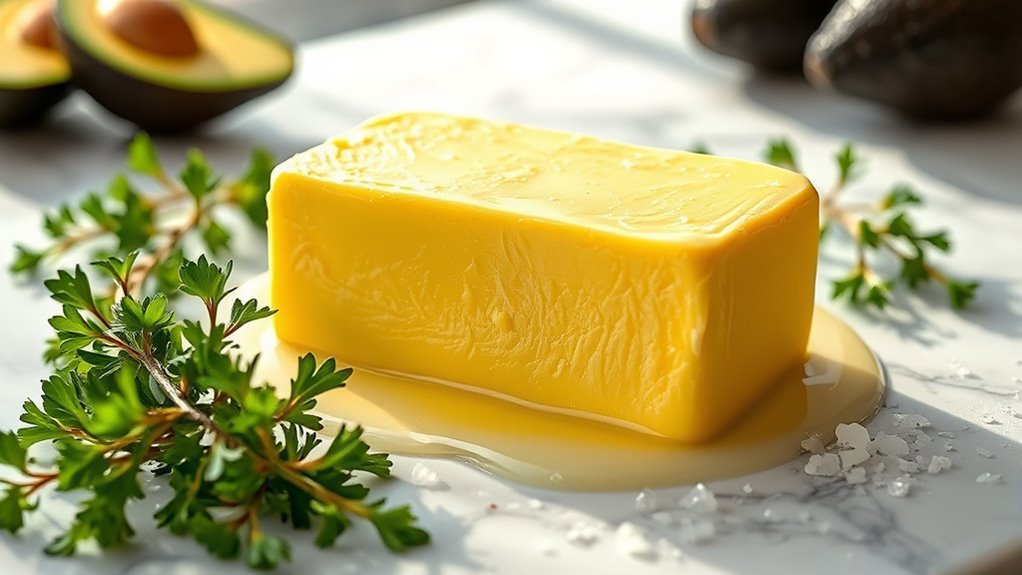Yes, butter is keto-friendly due to its high fat content and low carb profile. It’s rich in vitamins A, D, E, and K, and contains butyrate, which promotes gut health. Grass-fed butter offers added omega-3s, while ghee is easier to digest. Moderation is key to avoid excess calories, but incorporating butter can enhance flavor in your meals. There’s much more to discover about butter’s role in a balanced keto diet, so stick around for more insights!
The Nutritional Profile of Butter

When it comes to the nutritional profile of butter, this creamy staple packs a punch with its fat content. Butter’s composition is primarily made up of saturated fats, which can be a major energy source, especially in a ketogenic diet. In addition to fat, butter contains vitamins A, D, E, and K, making it a nutrient-dense choice for those seeking healthy fat sources. It’s also rich in butyrate, a short-chain fatty acid that may support gut health. While butter offers numerous benefits, moderation is key. It’s important to balance your intake to avoid excess calories. Ultimately, butter can be a delicious and nutritious part of your diet, aligning well with your desire for freedom in food choices.
Types of Butter and Their Keto Compatibility

When considering butter on a keto diet, it’s crucial to know the variations available. Grass-fed butter offers additional nutrients and healthier fats, while clarified butter can provide a higher smoke point and easier digestion. Understanding these options can help you make informed choices that align with your keto goals.
Grass-Fed Butter Benefits
Although many types of butter can fit into a keto diet, grass-fed butter stands out due to its superior nutritional profile. It offers grass-fed advantages like higher levels of omega-3 fatty acids and fat-soluble vitamins, which can be beneficial for your overall health. Choosing grass-fed butter means you’re supporting better butter sourcing practices, ensuring the cows are raised on a natural diet.
| Nutrient | Grass-Fed Butter | Conventional Butter |
|---|---|---|
| Omega-3 | Higher | Lower |
| Vitamin K2 | More Abundant | Less Available |
| CLA | Increased | Minimal |
| Antioxidants | Present | Limited |
| Flavor | Richer | Milder |
Incorporating grass-fed butter into your meals not only enhances flavor but also aligns with a health-conscious lifestyle.
Clarified Butter Options
Clarified butter, often referred to as ghee, is a popular choice for those following a keto diet due to its high fat content and minimal lactose, making it easier to digest for many. Here are some ghee benefits and butter substitutes to evaluate:
- Ghee: Rich in vitamins A, D, and E, ghee offers a high smoke point, making it excellent for cooking at high temperatures.
- Coconut Oil: A great butter substitute, coconut oil is packed with medium-chain triglycerides (MCTs), which can boost energy and support ketosis.
- Olive Oil: While not a direct butter replacement, olive oil is a heart-healthy fat that works well in dressings and low-heat cooking.
Incorporating these options can enhance your keto journey while providing variety and flavor.
Health Benefits of Butter on a Keto Diet

Butter offers several health benefits that align well with a keto diet, making it a valuable addition for those looking to enhance their low-carb lifestyle. When you consume butter, you’re not just enjoying its rich flavor; you’re also gaining nutrients that support your wellness.
| Health Benefit | Description | Impact on Keto |
|---|---|---|
| High in Healthy Fats | Contains saturated fats and vitamins | Promotes ketosis |
| Source of Energy | Provides quick energy for your body | Fuels low-carb living |
| Rich in Antioxidants | Contains compounds that fight oxidative stress | Supports overall health |
Incorporating butter consumption into your diet can aid in nutrient absorption and help maintain energy levels, allowing you to thrive on your keto journey.
How to Incorporate Butter Into Your Meals
When you’re looking to enhance your meals on a keto diet, incorporating butter can be a simple yet effective strategy. Its rich flavor and healthy fats make it versatile for various dishes. Here are some meal ideas to boost your butter usage:
- Sautéed Vegetables: Toss your favorite low-carb veggies in butter for a delicious side.
- Butter Coffee: Blend butter with your morning coffee for a creamy, energy-boosting drink.
- Butter-Based Sauces: Create sauces like garlic butter to drizzle over grilled meats or seafood.
Butter vs. Other Fats: What’s Best for Keto?
While many keto dieters gravitate toward butter for its rich flavor and healthy fat content, it’s essential to compare it with other fats commonly used in this low-carb lifestyle. Olive oil, for instance, offers a heart-healthy monounsaturated fat profile, making it a great butter alternative. Coconut oil, with its medium-chain triglycerides, provides quick energy, while avocado oil is filled with beneficial nutrients and has a high smoke point. When considering fat sourcing, think about your individual health goals and preferences. Each fat has its unique benefits, so incorporating a variety of these options can enhance your meals and keep your diet interesting. Ultimately, it’s all about what works best for you on your keto journey.
Common Misconceptions About Butter and Health
You might have heard that butter is bad for your heart or that its saturated fat content can lead to health issues, but recent research challenges these beliefs. Additionally, while butter is calorie-dense, it can fit into a balanced diet when consumed mindfully. Let’s explore these common misconceptions and see what the evidence really says about butter and health.
Butter and Heart Health
Although butter has long been vilified in discussions about heart health, recent research suggests that this perception may be based more on myths than facts. Here are some key points to reflect on regarding butter benefits and heart disease:
- Nutrient Density: Butter contains essential vitamins like A, D, E, and K, which support overall health.
- Moderation Matters: When consumed in moderation, butter can be part of a balanced diet without greatly raising heart disease risk.
- Quality Counts: Grass-fed butter may offer additional omega-3 fatty acids and conjugated linoleic acid, potentially benefiting heart health.
It’s important to evaluate butter within the context of your overall diet. Embracing butter in moderation can allow you to enjoy its rich flavor without compromising your heart health.
Saturated Fat Myths
Many people believe that saturated fat, particularly from sources like butter, is inherently unhealthy and contributes to heart disease; however, this view often oversimplifies the complexities of dietary fats. The saturated fat debate has generated numerous heart disease myths. Research indicates that the relationship between saturated fat and heart health is not as clear-cut as once thought.
| Myth | Reality | Evidence |
|---|---|---|
| Saturated fat causes heart disease | It’s more complex than that | Studies show mixed results |
| Butter raises cholesterol levels | Not all cholesterol is harmful | LDL vs. HDL – the role matters |
| All fats are equal | Quality and source count | Whole foods vs. processed fats |
Understanding these nuances can empower you to make informed dietary choices.
Caloric Density Concerns
While some might worry about butter’s caloric density, it’s essential to reflect on how these calories fit into a balanced diet. Here are three key points to take into account:
- Caloric Intake: Butter is calorie-dense, but when used in moderation, it can enhance flavors without excessive caloric intake.
- Portion Control: Keeping an eye on portion sizes allows you to enjoy butter while staying within your daily caloric needs.
- Nutrient Density: Butter provides fat-soluble vitamins like A, D, and K, which are crucial for health.
Embrace the idea that it’s not just about the calories but how you incorporate them into your meals. With mindful choices, butter can be a flavorful part of a keto-friendly lifestyle without compromising your health goals.
Potential Risks of Consuming Butter on Keto
When incorporating butter into your keto diet, it’s important to contemplate potential risks that may arise. While butter is a staple in many keto meals, it can pose issues for some individuals. For instance, those with butter allergies might experience adverse reactions, making it vital to identify any sensitivities before indulging. In addition, consuming excessive amounts of butter may lead to elevated cholesterol levels, which could heighten the risk of heart disease for certain people. Balancing your butter intake with other healthy fats and monitoring your overall health is essential. Always consult with a healthcare professional if you have concerns about how butter might affect your body, especially regarding allergies or cholesterol changes. Freedom in your diet comes with responsibility and awareness.
Delicious Keto Recipes Featuring Butter
If you’re looking to elevate your keto meals, incorporating butter can add rich flavor and a satisfying texture to a variety of dishes. Here are three delicious recipes featuring butter that you’ll love:
- Garlic Butter Shrimp: Sauté shrimp in savory butter with garlic and herbs for a quick, flavorful meal.
- Butter Coffee: Blend coffee with butter and MCT oil for a creamy, energizing drink that keeps you in ketosis.
- Keto Butter Cake: Indulge in a moist butter dessert made with almond flour, perfect for satisfying your sweet tooth without the carbs.
These recipes show how versatile butter can be on a keto diet, enhancing both savory dishes and sweet treats. Embrace the freedom to enjoy these delicious options!
1. Is butter considered keto-friendly?
Yes, butter is considered keto-friendly. It is high in fat and low in carbohydrates, making it an excellent choice for those following a ketogenic diet. Butter provides a source of healthy fats that can help you meet your daily fat intake goals while keeping your carb intake low.
2. What type of butter is best for a keto diet?
The best type of butter for a keto diet is unsalted grass-fed butter. Grass-fed butter tends to have a higher concentration of omega-3 fatty acids and vitamins like A and K2 compared to conventional butter. Unsalted butter also gives you more control over your sodium intake, which can be beneficial for those monitoring their salt consumption.
3. Can I use butter for cooking on a keto diet?
Absolutely! Butter is a versatile cooking fat that can be used for sautéing, baking, and even as a base for sauces. It has a relatively high smoke point, making it suitable for many cooking methods. Just be mindful of the cooking temperature to prevent burning, which can create harmful compounds.
4. How much butter can I consume on a keto diet?
The amount of butter you can consume on a keto diet depends on your individual macronutrient goals. Generally, a ketogenic diet consists of about 70-75% of your calories coming from fats. If butter fits within your daily fat allowance, you can enjoy it in moderation. It’s important to balance your overall fat intake with other sources of healthy fats like avocados, nuts, and olive oil.
5. Does butter contain any carbohydrates?
No, butter contains negligible carbohydrates. A typical serving of butter (about one tablespoon) has less than 1 gram of carbs. This makes it an ideal option for those on a ketogenic diet, as it allows you to add flavor and richness to your meals without significantly impacting your carbohydrate intake.
References
- https://www.wikiHow.com/Use-Butter-on-a-Keto-Diet
- https://www.healthline.com/nutrition/keto-diet-guide
- https://www.ncbi.nlm.nih.gov/pmc/articles/PMC6470868/
- https://www.verywellfit.com/what-is-the-keto-diet-5112706
- https://www.webmd.com/diet/what-is-the-ketogenic-diet
- https://www.ncbi.nlm.nih.gov/pmc/articles/PMC6412066/
- https://www.bbcgoodfood.com/howto/guide/keto-diet-what-you-need-know
- https://www.usda.gov/fooddata-central
- https://www.health.gov.au/resources/publications/the-ketogenic-diet


